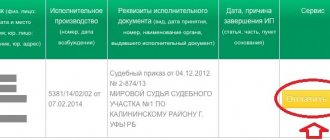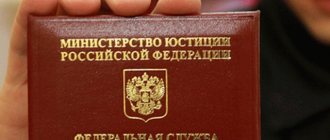Is it possible to pay for a bailiff's order in another city?
Force majeure refers to circumstances that precluded the ability to pay.
For example, a flood. A person lives in special climatic conditions in which the likelihood of flooding is high. The roads are washed out, people are caught in the elements. In this case, this circumstance will fall under the concept of “force majeure”. Do not forget about the importance of proving circumstances that are valid. There are some cases when the subject is completely exempt from this payment. Let's look at them further. There is a legal procedure that allows you to collect debt from any person, including a pensioner. Its enforcement practice is carried out by the Bailiff Service (SSP), acting on the basis of decisions of the judicial authority. The law imposes restrictions on deductions from a pensioner’s income in favor of third parties. Let's look at the procedure and from what amounts legal deduction is made in 2020.
This video is unavailable
4276450017181948 SBERBANK CARD 410012584333034 YANDEX MONEY R464327711283 WEBMONY ———————————————————————————————————— Full video from the Tsargrad TV channel "
Glazyev - https://youtu.be/YQ66QvzNAus
?t=2375 Full video with Katasonov’s statement https://www.youtube.com/watch?v=DsXN0.
Full video about consulting https://youtu.be/F-zpf_eVlSk
?list=PLo. How to find foreign ones https://rusnod.ru/novosti/v-rossii/inf. ) ———————————————————————————————————- What I tell you in this video is important for everyone to know, because directly affects the well-being of all Russian citizens. There are many videos on the Internet in which people are indignant: “Why in other countries, where there is much less oil, are gasoline prices either the same or even lower?” I will now explain in detail why there is such injustice, as always with facts. I support everything I have said with statements from authoritative, competent people. The price of gasoline not only hits your pocket directly, for example, when paying at a gas station and buying transport tickets, but also hits your pocket indirectly: it is included in the final price of all goods and components for their production, such as delivery, transportation, manufacturing, and This requires fuel. There was a particularly big jump in 2020, when the price jumped from 41 rubles per liter to more than 46 at the peak. The Russian media, as usual, kept silent about the essence of the problem, in the style of “we’re going the right way, everything is fine,” they just shuffled the taxes a little and then, by chance, an inconsistency emerged, “now we’ll come to an agreement with the oil industry,” “we’ll reduce the excise tax,” that is, we’ll take money from budget and give it to the “beggars”, the oil industry... This means taking it from the people and giving it to the oil oligarchs. Which is what was done. Well, and other nonsense, just not to talk about the essence. But the point is that the sharp increase in gasoline prices is a consequence of another flawed decision by our economic authorities on direct orders from the United States. I’ll immediately cite a fact that confirms this, and then I’ll explain everything in detail. For now, remember what the Presidential Advisor said, that the abolition of export duties (one of the reasons for the rise in gasoline prices) was imposed by the Americans. And this action is just beginning to unfold. As a result, it will lead to a gasoline price of 70 rubles per liter, or even more. And in Russia, in a country that, according to OPEC, in 2020 occupied second place in the list of countries in the world for oil production, gasoline will cost the same as it costs in countries without oil, as much as our gasoline is sold abroad for, minus transportation costs for its removal, as if we had no oil at all.
A little theory. The way to take away the benefits of oil production from us is very elegant. They called it “tax maneuver.” It consists in the gradual abolition of export duties on oil with a simultaneous increase in the mineral extraction tax. An export duty is the collection of money from the sale of natural resources overseas. Are you going abroad? Give me money. So our authorities stupidly refuse this money, give the green light to export natural resources abroad and at the same time introduce a tax on the extraction of minerals. This means that it all falls on the shoulders of the common people (glazes). And this is what happens: the barrier at the border is gradually being reset, in return the production tax is increasing, which is passed on to the shoulders of Russian consumers, the price of gasoline in Russia is gradually increasing, the population is buying less and less of it, inflation is accelerating, the economy oriented towards the domestic market is collapsing due to for falling purchasing power of the population and rising costs, and, as a result, we are all becoming even poorer. Only oil exporters are left in the dark. Their state is literally pushing them to send everything abroad, further creating a shortage within Russia and thereby further increasing the price of gasoline. If there is no barrier at the border in the form of duties, then, of course, it is more profitable to sell oil abroad, where they will pay more for it. That is. What does this tax maneuver and the mineral extraction tax mean? After all, this directly harms the state. And the authorities are doing everything they can to drive mineral resources abroad. How is that? This is direct proof that “Russia is a raw material appendage – a gas station of the American unipolar world.”
We recommend reading: How is the Funeral Benefit Paid in 2020?
Pay debts to bailiffs
Hello Elena. Only one thing will help you here, draw up with them, or in my opinion, where you owe, an agreement that you will pay the debt, but only in a certain amount that you indicate yourself, at least 500, at least 1000 rubles, argue that it is more You are not able to pay this amount, but you have every right to this and that’s all.
In order for the bailiff to get the debt out of the company, it is necessary that the money that circulates in it be white. If this money doesn’t go anywhere, the bailiff is powerless. Come to an appointment with the bailiff. Look at your production (you have every right to get acquainted with the materials), or better yet, let them make copies of each piece of paper for you and read everything at home. You just need to see the responses from the registration authorities. to which the bailiff was obliged to send requests. look at what date they are dated. in this case, requests should have already been sent at least twice. Further, if, for example, you see an answer from the traffic police that the cars are registered with the company, write directly on the piece of paper under the sign? “prohibition of registration actions, arrest”, then the tax office’s answer about accounts or other taxable property is again a question and write “seizure on the account, etc. Check all the answers, then see if this was issued by the bailiff if there is property. And just in case, let the bailiff certify all copies of the production.
Insurance premiums including penalties
06. In fact, these amounts were paid simultaneously only on June 18.
In this case, the amount of penalties for late payment of insurance premiums for the month of April will be accrued from May 16 to June 17. and for late payment of insurance premiums for the month of May. will be credited from June 16th to 17th.
Payment of the insurance premium is recognized as made on the day the policyholder transfers the amount of the insurance premium by payment order from his current bank account, of course, if there is a sufficient amount of funds in the current account to transfer insurance payments.
Budget classification codes for payment of insurance premiums
established by Article 14 of the Federal Law of July 24, 2009 No. 212-FZ “On insurance contributions to the Pension Fund of the Russian Federation, the Social Insurance Fund of the Russian Federation, the Federal Compulsory Medical Insurance Fund”) 392 1 02 02140 06 1200 160 insurance contributions for compulsory pension insurance in a fixed amount, credited to the budget of the Pension Fund of the Russian Federation for the payment of an insurance pension (calculated from the amount of the payer’s income received in excess of the income limit.
Procedure for paying insurance premiums in 2020
rub.
for the billing period.
In this case, the amount of insurance premiums cannot be more than the amount determined as the product of eight times the minimum wage established by federal law at the beginning of the financial year for which insurance premiums are paid, and the rate of insurance contributions to the Pension Fund of the Russian Federation established by paragraph 1 of part 2 of the article 12 of Federal Law No. 212-FZ increased 12 times (154,851.84 rubles in 2020). Part 8 of Article 14 of Federal Law No. 212-FZ establishes that for the purpose of applying the provisions of Part 1.1 of Article 14 of Federal Law No. 212-FZ, the amount of income of the payer is determined as follows: 1) for payers paying personal income tax (hereinafter - personal income tax) , - in accordance with Article 227 of the Tax Code of the Russian Federation (hereinafter referred to as the Tax Code of the Russian Federation); 2) for payers applying the taxation system for agricultural producers (unified agricultural tax) (hereinafter referred to as the Unified Agricultural Tax) - in accordance with paragraph 1 of Article 346.5 of the Tax Code of the Russian Federation; 3) for payers using the simplified taxation system (hereinafter referred to as the simplified tax system) - in accordance with Article 346.15 of the Tax Code of the Russian Federation; 4) for payers paying a single tax on imputed income for certain types of activities (hereinafter referred to as UTII) - in accordance with Article 346.29 of the Tax Code of the Russian Federation; 5) for payers using the patent taxation system (hereinafter referred to as the PSN) - in accordance with Articles 346.47 and 346.51 of the Tax Code of the Russian Federation; 6) for payers applying more than one tax regime, taxable income from activities is summed up.
In this case, the amount of the payer’s income should be understood as: 1) for UTII - the amount of imputed income, calculated taking into account the totality of conditions that directly affect the receipt of the specified income (Articles 346.27, 346.29 of the Tax Code of the Russian Federation); 2) for PSN - the amount of potential income to be received during the validity period of the patent (Article 346.47 and 346.
51 Tax Code of the Russian Federation); 3) for personal income tax, unified agricultural tax, simplified taxation system - the amount of income received by him from business activities or from private practice (accordingly, articles 227, 346.5, 346.15 of the Tax Code of the Russian Federation).
Thus, payers using UTII or PSN are guided accordingly by the amount of imputed or potentially receivable income, the procedure for determining which is established by the Tax Code of the Russian Federation.
Payment of insurance premiums
If the payer of insurance premiums simultaneously belongs to several categories of payers of insurance premiums specified in Part 1 of this article or in the federal law on a specific type of compulsory social insurance, he calculates and pays insurance premiums for each basis. GUARANTOR: See the scheme “Payers of insurance premiums” Information about changes: Federal Law of December 8, 2010
Insurance premiums for compulsory insurance
The object of taxation is: payments and other remuneration accrued in favor of individuals under employment contracts (wages, vacation pay, bonuses, etc.)
P.); payments and remuneration under civil law contracts (except for those listed below, which are not subject to contributions), which include construction contracts. service contracts.
agency agreements, etc.
P.; payments under copyright contracts.
Source: https://munh.ru/strahovye-vznosy-vkljuchaja-peni-96699/
Methods of paying debts to bailiffs
The official website of the bailiff service provides the opportunity to pay online court debt via the Internet immediately after finding out its amount and the reason for its occurrence. The payer's data will already be entered into the system, so you won't have to add it. To transfer money you need:
Terminals are located in many public places. Therefore, this method of transferring debt is available to anyone. The commission percentage for transferring funds will depend on the payment method. So, you can pay off your debt for free using a QIWI wallet. Most FSSP divisions have terminals for debt repayment. Therefore, citizens who come to communicate with a bailiff have the opportunity to pay their debts on the spot. For unpaid debt, penalties such as restriction of travel outside the country are imposed. Persons subject to such sanctions can pay off debts using terminals and ATMs at airports.
We recommend reading: Where can you get a divorce certificate?
Is it possible to pay a debt to the bailiffs to another person in another city?
On the website of the Federal Bailiff Service (FSSP) there is a database of enforcement proceedings, with which you can find out about the existence of a debt and pay it immediately. To do this, just indicate your region, full name and date of birth. If there is a debt, the system will find and provide all the necessary data and offer to pay.
In Art. 313 of the Civil Code of the Russian Federation states in this regard: The fulfillment of an obligation may be entrusted by the debtor to a third party, unless the law, other legal acts, the terms of the obligation or its essence imply that the debtor is obliged to fulfill the obligation personally. In this case, the creditor is obliged to accept the performance offered for the debtor by a third party.
ATTENTION . The tax inspectorate in alliance with bailiffs AGAINST CITIZENS.
This letter is aimed at the Federal Tax Service using all opportunities to collect tax arrears from individuals. The message is compiled in such detail that it is time to serve as instructions for the work of lawyers specializing in enforcement proceedings. In accordance with the letter, the territorial tax authorities are prescribed (“recommended” - as indicated in the letter), including the following:
- If the debt exceeds 3 thousand rubles, simultaneously with sending to the territorial bodies of the Federal Bailiff Service a judicial act that has entered into force, send a petition to seize the debtor’s property and information about the taxpayer’s accounts, as well as the availability of the debtor’s property (clauses 1, 2 ,4 Letters).
- If the amount of debt exceeds 10 thousand rubles, send to the bailiff an application for a temporary restriction on the debtor’s departure from the Russian Federation (Article 67 of the Law on Enforcement Proceedings, clause 3 of the Letter).
- If within 2 months the Federal Bailiff Service of Russia does not receive a resolution to seize the debtor’s property, send a notification that the taxpayer has property for the purpose of seizure, or a resolution prohibiting registration actions with the property (clause 5 of the Letter).
- If the debt is more than 50 thousand rubles - for property taxes, more than 250 thousand rubles - for personal income tax, organize joint raids to seize the debtor’s property; send a request about the reasons for the failure to provide information or the lack of assessment of the debtor’s seized property; send a request for an explanation of the reasons for the absence of a Resolution on the transfer of seized property for sale, or information about such a Resolution (clauses 6, 7, 8 of the Letter).
- If the debtor “does not have property that can be foreclosed on, the tax authority must familiarize itself with the materials of the enforcement proceedings in order to establish the existence of measures taken by the bailiff to obtain information about the debtor’s place of work and foreclosure on wages and other periodic payments.” (Clause 9 of the Letter). However, “if the amount of debt does not exceed 25 thousand rubles, the tax authority... after receiving... information from the Pension Fund of the Russian Federation about the policyholder making mandatory payments (insurance contributions for compulsory pension insurance), sends them no later than 10 working days to an organization or other person paying wages, pensions, stipends and other periodic payments to the debtor, a writ of execution on the collection of funds” (clause 10 of the Letter).
- Once a quarter, remind bailiffs about enforcement proceedings for the collection of taxes from individuals and once every six months carry out a reconciliation of enforcement proceedings (clauses 12, 13 of the Letter).
- Send through the department of the Federal Tax Service of Russia for the constituent entity of the Russian Federation to the corresponding department of the FSSP of Russia for the constituent entity of the Russian Federation information about enforcement proceedings lasting more than 6 months and in respect of which debt collection is not carried out.
- Together with the territorial bodies of the Federal Bailiff Service and the State Road Safety Inspectorate of the Ministry of Internal Affairs of the Russian Federation, participate in raids to collect property tax debts from individuals in the most frequently visited public places (airports, large retail outlets, etc.) ( paragraph 15 of the Letter).
As noted above, the Letter represents detailed instructions for the work of tax inspectorates with bailiffs in debt collection. This, if we think “in state terms,” is the positive part of the Letter.
However, how advisable is it to indicate a letter of seizure of the debtor’s property if the debt is more than 3 thousand rubles? This arrest also involves the seizure of the debtor’s property at his place of residence. At the same time, sending a writ of execution to the debtor’s place of work for debts of up to 25 thousand rubles is provided for only in paragraph 10 of the Letter, and then only on the condition that the tax authorities have information about income. There is no obligation (or recommendation) for the tax authorities to request such information.
Actions in a situation where the fine is paid and the case is transferred to the bailiff service
A situation may occur to a person that his appeal will not be considered on time. Because of this, a problem will arise such as a visit by bailiffs to the debtor’s place of residence. You should not be scared, much less close the door in front of them or simply not respond to a knock. Any reasonable person should not hide from these people, otherwise new problems will appear.
It is also worth considering that there are errors directly in the payment management center. Let’s say a person transferred funds using several details at once. And because of this, the system was unable to determine their purpose and final destination. As a result, government services involve bailiffs in the case.
How bailiffs collect debts from individuals by court decision
The next measure is a travel ban imposed by the bailiff against the debtor outside Russia. In some cases, this matters, so you should not neglect it - you must use all possible measures to collect your debt. But if the debtor leads a marginal lifestyle and does not intend to travel abroad, then this coercive measure will not have any effect.
Debt collection is a complex process. However, there are certain procedures aimed at implementing a court order that allow you to quickly collect debt from working individuals who own certain property. If the debtor does not work, does not own any property, is a minor, or resides in not so remote places, the situation becomes significantly more complicated.
When the tax office transfers the case to the bailiffs
The tax office communicates with me through Sberbank - everyone is happy except me. And it would seem that Sberbank has something to do with it. (c) S. Dorenko. Second time in six months. It looks like the path has been dashed off: Tax -> mail (?) -> Bailiffs -> Sberbank -> Ya. In the best bureaucratic traditions, the system creates a problem out of the blue - through heroic efforts (mainly on my part) it solves it - reports on successes.
Transferring the court decision to bailiffs. 1. Go to court, write an application for the issuance of a writ of execution. 2. You receive a writ of execution in court. 3. Take the writ of execution and application to the bank where the debtor has an account (if you know such a bank. It is not necessary to know the account number). If there is money in the account, the bank will transfer it to you within three days. 4.
How and within what period can the tax authority collect tax debts?
At the request of the tax inspectorate, the magistrate at your place of residence can issue a court order without a trial or summons of the parties.
Within three days from the date of issue of the order, a copy of it will be sent to you. Before the court order is issued, as well as within 20 days after sending a copy of the order, you have the right to submit your objections (Article 17.1, Part 3 of Article 123.5 of the CAS RF). 2. You have not fulfilled the requirement to pay taxes (penalties, fines) within the prescribed period (as a general rule, eight working days from the date of receipt). A different, longer period may be established in the requirement itself. Thus, the Federal Tax Service of Russia recommended that lower tax authorities provide taxpayers with 30 to 45 calendar days for voluntary payment of arrears (penalties, fines) (clause 6 of article 6.1, clause 1 of article 48, paragraph 4, clause 4, clause 8 Article 69 of the Tax Code of the Russian Federation; Letter of the Federal Tax Service of Russia dated October 21, 2015 N GD-4-8/ [email protected] ).
If the traffic police fine is handed over to bailiffs - where to pay the fine
A traffic violation that does not cause significant harm to society is an administrative offense. This concept also includes such violations as causing moderate or minor harm to human health and driving while intoxicated.
- QIWI (no commission);
- "Promsvyazbank" - electronic payment systems;
- ROBOCASH;
- Tinkoff (transfer without commission);
- Webmoney;
- Payment for State Services.ru. On this resource it is possible to transfer payment in money from a mobile phone or using Euroset salons;
- Paymo;
- Yandex. Money, it is possible to pay through mobile phone stores;
- Simple Payments system;
- City system of Roskomsnabbank;
- STATE PAYMENT.
We recommend reading: Statement from the management company regarding the elimination of mold in the apartment
Procedure for paying debts to the Bailiff Service
The same measures are taken against those who not only violated traffic rules. Bailiffs work on the cases of those who have not paid child support and credit debts on time. Quite often, cases of those who evade taxes fall under the jurisdiction of the service.
Payment is possible using any terminal that allows you to pay money to the state budget. It is convenient to pay your FSSP debt in Russia in this way, because terminals are installed in all cities. If you have a writ of execution, then the algorithm looks like this:
Debts due to bailiffs
- at the expense of monthly income - for example, a certain percentage of the debtor’s salary is transferred to the creditor;
- at the expense of valuables and property belonging to the debtor - bank deposits, as well as funds received after the sale of a vehicle, luxury items, furniture, household appliances.
“According to our work experience. In 96% of cases, payments are reduced tenfold or completely withdrawn through several legal procedures. This can take from five working days (if we are talking about canceling a document) to 3 months. Difficult situations, when the debtor did not ask for help in time, and creditors and bailiffs managed to understand that he was able to pay, can also be solved. However, this will take up to 12–18 months.” Evgeniy Plotnikov, lawyer for credit disputes
Project Laws for People
But no. The law, and this is the Federal Law “On Enforcement Proceedings,” limited the capabilities of bailiffs in terms of foreclosure on the income of debtors. Thus, not all of the debtor’s income may suffer from the actions of the bailiff. Let's find out soon that income can be saved from the long hands of bailiffs.
What did I say? Bailiff! Hands off the amounts of one-time financial assistance that is paid to the debtor: in connection with a natural disaster (other emergency); in connection with a terrorist act; due to the death of a family member; in the form of humanitarian aid; for assistance in identifying, preventing, suppressing and solving terrorist acts and other crimes. I think this is correct. What happens is that the state gives money and immediately takes it back. Not good.
The debt is repaid, but the bailiffs do not remove it from the database
You can also easily write a statement or complaint by registering on the FSSP website and sending your appeal through your personal account, it will be faster. On the same website you can familiarize yourself with a sample form of a complaint against the actions or inactions of a bailiff.
Submit an application with a resolution attached to it to the person authorized to receive appeals, always in two copies, on your copy the person who accepted the complaint must put the incoming number, the date of acceptance and his position, this is mandatory, from the date of acceptance we count 10 days (Part 1 of Article 126 of the Federal Law “On enforcement proceedings”), within this period you must be given an answer and take the necessary actions to remove you from the FSSP database.
We recommend reading: Are There Transport Tax Benefits for Pensioners in the Tver Region
How not to pay debts to bailiffs and is it possible to pay in parts?
According to paragraph 12 of Art. 30 Federal Law of 02.10.2007 No. 229-FZ “On Enforcement Proceedings” (hereinafter referred to as Law No. 229-FZ), after the debtor receives a resolution to initiate enforcement proceedings, issued on the basis of a court decision or court order, a bailiff, a five-day period is established when the debtor can voluntarily fulfill his obligation. This resolution can be appealed by the debtor in court, and a petition can also be filed to suspend enforcement proceedings in the cases specified in Art. 39-40 of Law No. 229-FZ.
The procedure for forced collection from the debtor of monetary obligations occurs only at the moment when the court has satisfied the claims of the credit organization to collect the debt under the loan agreement. But a court decision or court order alone is not enough to begin enforcement proceedings; the conditions established by law must be met:
Is it legal for the Pension Fund to contact bailiffs?
The Pension Fund of the Russian Federation makes a decision to collect the arrears from other property of the organization and transfers the case to bailiffs only after it has been unable to recover it from funds.
Thus, if the debt collection procedure was violated, then the Pension Fund of the Russian Federation had no reason to turn to bailiffs.
Considering the small amount of the collected amount, it is advisable to repay it and then contact the Pension Fund with an application for the return of excessively collected insurance premiums with interest.
The rationale for this position is given below in the materials of the Glavbukh System
1. Recommendation: How to recover arrears in contributions to compulsory pension (social, medical) insurance
Request for payment
Within three months from the date of discovery of the arrears, the fund department is obliged to send the organization a request for payment of insurance premiums (fines, penalties). The dates of detection of arrears are recorded in special certificates*. This is stated in Part 2 of Article 22 of the Law of July 24, 2009 No. 212-FZ. The forms of requirements and certificates were approved by order of the Ministry of Health and Social Development of Russia dated December 7, 2009 No. 957n.
The requirement can be submitted to the head of the organization (its legal or authorized representative)*:
- personally against signature;
- by registered mail. In this case, the request is considered received after six working days from the date of sending the registered letter;
- in electronic form via telecommunication channels. The formats, procedure and conditions for sending claims for payment of arrears via telecommunication channels must be established by the Pension Fund of the Russian Federation and the Social Insurance Fund of Russia.
Decision on collection
If the arrears are not repaid within the established period, the fund department will make a decision on the forced collection of insurance premiums* (Part 1, Article 19 of the Law of July 24, 2009 No. 212-FZ). The forms of decisions were approved by order of the Ministry of Health and Social Development of Russia dated December 7, 2009 No. 957n.
As a general rule, fund employees must prepare a decision on collection no later than two months from the moment when the deadline for fulfilling the requirement for voluntary repayment of arrears has expired (Part 5, Article 19 of Law No. 212-FZ of July 24, 2009).
This rule does not apply to small amounts of arrears - in such cases, representatives of funds can make a decision to collect several claims at once, if the total debt on them (including penalties and fines) does not exceed: - 1500 rubles. – on payments to the Pension Fund of the Russian Federation; – 500 rub. – for payments to the Federal Social Insurance Fund of Russia.
The deadline for making decisions in these situations is 14 months from the date on which the deadline for voluntary compliance with the earliest requirement has expired.
Decisions made after the established deadlines are considered invalid. It is not necessary to fulfill them.
This follows from the provisions of parts 5.1–5.3 of Article 19 of the Law of July 24, 2009 No. 212-FZ.
If the deadlines established for making decisions on collection are missed, representatives of the funds can collect the arrears in court.
Moreover, in the first case, they must go to court no later than six months from the moment when the deadline for fulfilling the requirement for voluntary repayment of the arrears expired.
In the second case - no later than six months from the moment when the deadline for making a decision on collecting the arrears expired.
This is stated in parts 5.4–5.6 of Article 19 of the Law of July 24, 2009 No. 212-FZ.
The decision to collect the arrears must be communicated to the organization within six working days after its adoption*. The decision on recovery can be transferred to the head of the organization (authorized representative):
- personally against signature;
- by registered mail. In this case, it is considered received after six working days from the date of sending the registered letter;
- in electronic form via telecommunication channels. The formats, procedure and conditions for sending decisions via telecommunication channels must be established by the Pension Fund of the Russian Federation and the Social Insurance Fund of Russia.
This procedure is provided for by Part 6 of Article 19, Part 6 of Article 4 of the Law of July 24, 2009 No. 212-FZ.
The fund department can forcefully collect the arrears at the expense of: – cash; – property; – accounts receivable.
Collection from cash
The decision to collect the arrears is executed through the bank in which the organization has an account. Within a month after the decision to collect the arrears was made, the fund branch must send to this bank an order to transfer insurance contributions (fines, penalties) (including in electronic form)* (Part 7, Article 19 of the Law dated July 24, 2009 No. 212-FZ). The bank is obliged to fulfill this order:
- no later than the next business day, if the collection is made from the organization’s ruble account;
- within two business days if the arrears are collected from a foreign currency account.
This procedure is provided for by Part 12 of Article 19 of the Law of July 24, 2009 No. 212-FZ.
If there is not enough money in the organization’s account to fully repay the arrears, the order is placed in the file cabinet of unpaid settlement documents.
In this case, the arrears will be repaid gradually as money arrives in the organization’s account. The bank will determine the balance of funds to repay the arrears after deducting the first and second priority payments.
This follows from the provisions of Part 13 of Article 19 of the Law of July 24, 2009 No. 212-FZ and paragraph 2 of Article 855 of the Civil Code of the Russian Federation.
If there is a shortage of money in a ruble bank account and the organization has a foreign currency account, the arrears can be recovered from foreign currency funds (Part 9, Article 19 of Law No. 212-FZ of July 24, 2009).
To do this, the fund branch must give the bank an order to sell the currency. The amount of arrears, which is repaid using foreign currency, is determined at the Bank of Russia exchange rate on the date of sale of the currency.
This procedure is provided for by Part 10 of Article 19 of the Law of July 24, 2009 No. 212-FZ.
It is prohibited to collect arrears from funds placed on the organization’s deposit account before the expiration of the deposit agreement (Part 11, Article 19 of Law No. 212-FZ of July 24, 2009).
If the arrears are not repaid at the expense of funds, the fund department may recover it at the expense of other property of the organization (Part 14, Article 19 of the Law of July 24, 2009 No. 212-FZ).
The decision on recovery at the expense of other property is made within one year after the end of the deadline for fulfilling the requirement to pay insurance premiums (fines, penalties)* (Part 3 of Art.
20 of the Law of July 24, 2009 No. 212-FZ).
Recovery from property
Collection of arrears at the expense of other property is carried out by a bailiff based on a decision and on the basis of a resolution issued by the department of the fund * (Part 2 of Article 20 of the Law of July 24, 2009 No. 212-FZ). In this case, the procedure provided for by the Law of October 2, 2007 No. 229-FZ must be observed.
The list of property that can be recovered to pay off the arrears is given in Part 8 of Article 20 of the Law of July 24, 2009 No. 212-FZ. The organization has the right to indicate the property that should be recovered first, however, the final decision on the order of recovery is made by the bailiff (Part 5 of Art.
69 of the Law of October 2, 2007 No. 229-FZ).
Lyubov Kotova,
Deputy Director of the Department
development of social insurance of the Russian Ministry of Labor
2. Recommendation: How to return (offset) overpaid (collected) contributions for compulsory pension (social, medical) insurance
Refund of overcharged contributions
If the organization was overcharged with insurance premiums, penalties or fines, it can be returned. The refunded amount will be reduced by the amount offset against the debt on penalties and fines for late (incomplete) payment of insurance premiums (if there is such a debt). This is stated in parts 1 and 2 of Article 27 of the Law of July 24, 2009 No. 212-FZ.
The amount of excess collected insurance premiums is returned to the organization with interest. An application for the return of an excessively collected amount can be submitted to the territorial branch of an extra-budgetary fund within one month from the day the organization learned about the excessive collection*. Complete your application:
- according to form 24-PFR - for the return of contributions to compulsory pension and health insurance (the application is submitted to the territorial office of the Pension Fund of the Russian Federation);
- according to form 24-FSS of the Russian Federation - for the return of contributions to compulsory social insurance (the application is submitted to the territorial branch of the FSS of Russia).
If the monthly deadline is missed, then the overpayment can only be recovered through the court. An organization has the right to file a claim in court within three years. Such rules are established by parts 5 and 6 of Article 27 of the Law of July 24, 2009 No. 212-FZ.
The decision to return the overcharged amount is made within 10 working days from the date of receipt of the corresponding application from the organization (Part 3 of Article 27 of the Law of July 24, 2009 No. 212-FZ).
Decisions on the return (offset) of the excessively collected amount of insurance premiums (penalties, fines) are drawn up:
1. Territorial branch of the Pension Fund of the Russian Federation:
- according to form 26-PFR - when returning the excessively collected amount of insurance premiums (penalties, fines);
- according to form 27-PFR - when offsetting the excessively collected amount of insurance premiums (penalties, fines).
2. Territorial branch of the FSS of Russia:
- according to Form 26-FSS of the Russian Federation - upon return of the excessively collected amount of insurance premiums (penalties, fines);
- according to Form 27-FSS of the Russian Federation - when offsetting the excessively collected amount of insurance premiums (penalties, fines).
Interest for late returns
The territorial branch of the fund must return the excessively collected amount within one month from the date of receipt of the application from the organization. Interest must be accrued for the period from the day following the day of collection until the day of return*. Interest can be calculated using the following formula:
| Interest on overcharged insurance premiums (penalties, fines) | = | Excessively collected insurance premiums (penalties, fines) | ? | The number of calendar days in the period from the day following the day of collection to the day of return | ? | 1/300 of the refinancing rate in force during this period |
Such rules are established by Part 9 of Article 27 of the Law of July 24, 2009 No. 212-FZ.
Interest is paid by the territorial department of the Treasury of Russia on the return of excessively collected insurance premiums. It is obliged to notify the fund department about the date and amount of the return (Part 10, Article 27 of the Law of July 24, 2009 No. 212-FZ).
If the interest is not paid in full, the fund branch, within three working days from the date of receipt of the notification of return, sends an order to the territorial administration of the Treasury of Russia to additionally pay the missing amount (Parts 11, 12 of Art.
27 of the Law of July 24, 2009 No. 212-FZ).
Lyubov Kotova,
Deputy Director of the Department
development of social insurance of the Russian Ministry of Labor
Source: https://www.glavbukh.ru/hl/23791-pravomerno-li-obrashchenie-pfr-k-sudebnym-pristavam
Writing off debts from a bailiff and the procedure for carrying out the procedure
- The party to the dispute has passed away, is officially declared missing, and there is no legal successor or heir.
- The defendant's opportunity to satisfy the claimant's demands is completely lost.
- At the initiative of the creditor.
- Repayment of debt in full.
The permissible presentation period shall not exceed three years upon satisfaction of lump sum payment claims and a similar time after the expiration of the periodic payments awarded. The execution procedure according to Art. 36 Federal Law No. 229 dated October 2, 2007 cannot exceed a two-month period.








